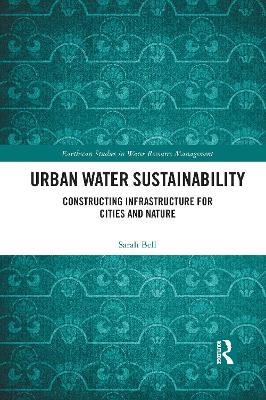
Urban Water Sustainability
Constructing Infrastructure for Cities and Nature
Seiten
2020
Routledge (Verlag)
978-0-367-59348-3 (ISBN)
Routledge (Verlag)
978-0-367-59348-3 (ISBN)
The provision of a safe and reliable water supply is a major challenge for the world's growing urban populations. This book investigates the implications of different developments in water technology and infrastructure for urban sustainability and the relationship between cities and nature.
The book begins by outlining five frameworks for analysing water technologies and systems - sustainable development, ecological modernisation, socio-technical systems, political ecology and radical ecology. It then analyses in detail what the sustainability implications are of different technical developments in water systems, specifically: demand management, sanitation, urban drainage, water reuse and desalination. The main purpose of the book is to draw out the social, political and ethical implications of technical changes that are occurring in urban water systems around the world, with positive and negative impacts on sustainability.
Distinguished from existing social science analysis due to its attention to the engineering details of the technology, this book will be of use to a wide audience, including students on water management courses, engineering students and researchers, urban geographers and planners interested in sustainability, infrastructure and critical ecology.
The book begins by outlining five frameworks for analysing water technologies and systems - sustainable development, ecological modernisation, socio-technical systems, political ecology and radical ecology. It then analyses in detail what the sustainability implications are of different technical developments in water systems, specifically: demand management, sanitation, urban drainage, water reuse and desalination. The main purpose of the book is to draw out the social, political and ethical implications of technical changes that are occurring in urban water systems around the world, with positive and negative impacts on sustainability.
Distinguished from existing social science analysis due to its attention to the engineering details of the technology, this book will be of use to a wide audience, including students on water management courses, engineering students and researchers, urban geographers and planners interested in sustainability, infrastructure and critical ecology.
Sarah Bell is Professor of Environmental Engineering and EPSRC Living with Environmental Change Research Fellow in the Bartlett School of Environment, Energy and Resources at UCL, UK. She is also Director of the Engineering Exchange, which serves to improve community engagement with engineering and built environment research. She is a Chartered Engineer and Fellow of the Chartered Institution of Water and Environmental Management.
1. Introduction 2. Water and sustainable cities 3. Constructing infrastructure 4. Framing cities and nature 5. Demand 6. Sanitation 7. Drainage 8. Reuse 9. Desalination 10. Conclusion
| Erscheinungsdatum | 01.07.2020 |
|---|---|
| Reihe/Serie | Earthscan Studies in Water Resource Management |
| Verlagsort | London |
| Sprache | englisch |
| Maße | 156 x 234 mm |
| Gewicht | 453 g |
| Themenwelt | Naturwissenschaften ► Biologie ► Ökologie / Naturschutz |
| Naturwissenschaften ► Geowissenschaften ► Geografie / Kartografie | |
| Technik ► Umwelttechnik / Biotechnologie | |
| Weitere Fachgebiete ► Land- / Forstwirtschaft / Fischerei | |
| ISBN-10 | 0-367-59348-3 / 0367593483 |
| ISBN-13 | 978-0-367-59348-3 / 9780367593483 |
| Zustand | Neuware |
| Informationen gemäß Produktsicherheitsverordnung (GPSR) | |
| Haben Sie eine Frage zum Produkt? |
Mehr entdecken
aus dem Bereich
aus dem Bereich
Lehrbuch zu Grundlagen, Technologie und Praxis
Buch | Hardcover (2022)
Hanser (Verlag)
34,99 €


